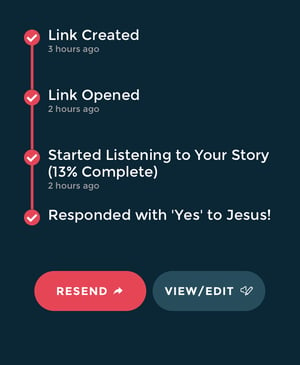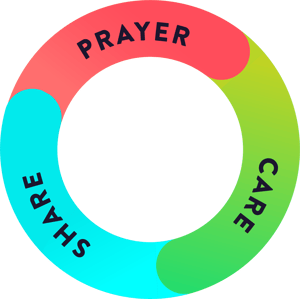Unless they offer an essential service, suddenly everybody has time for a small group. The #1 excuse people give for not joining a group is that they are too busy or they don’t have enough time for a small group. Small Group Pastors know what they are really saying is, “Small group is just not a priority.” I get that. But, now the “I don’t have time” excuse has been erased, and small groups should become a greater priority — even if they can’t meet in person.
Why do you need to start new groups during a pandemic?
Whether by choice or by mandate, people are staying away from other people right now. Church services have gone online. School has gone online in many places. While people are making their best attempts to curtail the spread of a disease, isolation and loneliness coupled with a steady intake of cable news and social media is a breeding ground for fear. Isolation and fear come straight from a page in the enemy’s playbook. The devil is having a heyday with this.
People have spiritual and emotional needs. With all of the conflicting information and no one to discuss this with, the monsters in our people’s heads just become bigger and bigger. Last week I wrote about practicing the “one anothers” of the Bible while in quarantine. People need more than worship and a sermon to reassure them and help them deal with what’s going on. Beyond that some people have practical, physical needs. How is your church keeping up with older people or people with medical conditions. We must find a strategic way to care for our members. Here’s a tough thought — your people can find a better online service. How you help them right now will determine where they go and where they give after this is all over. This is fertile ground for the enemy to do his work. This is a tremendous opportunity for the church to do its work.
As a church staff, you are working hard to transition worship and sermons to online services, but what about the social time people spent in the lobby or even in the parking lot. How are you meeting your members’ need for connection? This is the time to launch new groups. Groups could meet on a video platform. Groups could meet on a free conference call line. While many are forced to be apart, there are ways to be together.
How to Start New Groups in a Time When Everyone Has Time for a Small Group
Starting new groups online is not so different than starting groups offline, except you have one advantage. People need connection more than ever. Now is the time to get all hands on deck and start as many groups as possible. Churches must mobilize the most people they can for ministry right now. Your people need personal care like never before. You can do this. Here’s what you need to get started:
A willing, caring person to initiate.
If there was ever a time to bypass bulky requirements for group leaders and get all hands on deck, the time is now. Invite every person who will willing and caring to start a group right now. If you are insecure about that method, then review a copy of your church’s membership roster. Who would you feel good about? Call them and invite them right now. Who is willing and caring? Remember, they suddenly have time for a group.
A system to connect.
Once you have invited people to lead these groups, then ask them who they know who would be interested in a group. Take a week and have them invite everyone they know inside the church or outside the church to join their group. Then, invite the rest of your congregation to sign up online or even give out some names for leaders to call and invite to their group. The idea is that everyone in the congregation would have someone to connect with personally every week.
A platform to meet on.
Some localities are still allowing meetings of groups less than 10 people. If people are comfortable meeting in person, then they can. Personally, I would recommend an online option like a teleconference or a conference call. This will prohibit any unnecessary contact and potential spread of disease. Teleconference services such as Zoom, Google Hangouts, and other services offer a stable platform and an easy way to connect online with video. Most services offer a call-in number for those who might be less tech savvy. For a comparison of video platforms, click here. If video is not a good solution because of the internet service in your area, then a free conference line could work as well. Several services are available.
For families with children, encourage them to meet later in the evening when their kids have gone to bed. Wear headphones to eliminate background noise. Mute yourself when you’re not talking. And, do not take your device into the bathroom with you!
Curriculum to guide.
Your groups could start with just a weekly check in to see how everybody is doing. Start the meetings by allowing people to debrief what’s going on in their lives and in their minds. Another great way to start a new group is to ask people to tell their stories or at least the part of the stories that they’re willing to tell. This is an important way for the group to begin to understand each other and have context for what they share in the group.
For new leaders I have discovered that it’s best to use some sort of video-based curriculum that contains the teaching on the video. This makes things safe for both the new leader as well as the pastors. The new leader doesn’t have to be the Bible expert, and the pastors don’t want the new leader to teach or be the Bible expert anyway. By giving them a curriculum that you’ve created or a curriculum that you trust, you could assure that the group will follow the topic that you’ve given them and have a great meeting to encourage each other, build up their faith, and grow spiritually in an unusual time.
Just-in-time training and coaching. Don’t skip this step!
There won’t be a lot of time to train these leaders at first. I have discovered that if you recruit an established leader to follow up with new leaders, you create a win-win situation. The new leaders get help and support right when they need it, and the experience leader gets a trial run at being a coach. Once the trial is over, you can determine whether the new leaders will want to continue and whether the coaches should continue.
Just like groups can meet over a teleconference or conference call, training can also happen in the same way. In the last church I served we had an immediate need for coaches. I knew it would be difficult to add another meeting to an already busy schedule which included all of the coaches leading their own small group, so we met together on a conference line at about 8:30 at night for 30 minutes and did this for about six weeks in a row. Why did we meet so late? Well everybody was home from work, finished with dinner, and their kids were hopefully in bed. With all of these distractions removed, I was able to conduct the training and get these new coaches started. The same can be true for leader training, but I would recommend letting the coaches do the work for at least the first six weeks, then offer more formal training when the leaders are ready to move forward and when the leaders feel like they actually need the training.
Follow up and feedback.
Leading a small group and coaching is important work so you must inspect what you expect. If you’ve asked your coaches to call the new leaders every week, then you need to call the coaches every week and hear what’s going on with the groups. As a pastor, you want to know what’s going on with your people especially during a crisis. Your coaches can give you the needs that you need to address that maybe they cannot. You also get an accurate picture of what’s going on in your small group ministry. If you wait for a report, you are already in the weeds.
Do for your coaches what you expect them to do for your leaders. Just like your people need the care of a leader and your leaders need the care of a coach, your coaches need care from you. Now that your schedule has changed, it shouldn’t be too hard to pick up the phone and give each of your coaches a call.
Supervision and accountability.
While you have successfully given away the ministry to new leaders and new coaches, the only thing that you cannot give away is the responsibility for the ministry. The buck still stops with you. I don’t say this to make you nervous, but I do say this so you will avoid an entirely hands off approach. The coaching structure is effective, but it cannot run on auto pilot. While you are not in the day-to-day care of leaders, you cannot be completely out of it either. This is still your baby.
The End Result
In this climate, everything you do is essentially a startup. You cannot call a meeting and gather people on campus. You cannot do on-site training. You can’t even visit your people in their homes. But you can start online groups that will accomplish all of this. This may go against your personality. This may go against everything that you’ve done before. But the message is the same — We are better together even if we are apart.
By starting new small groups right now, your people will feel less lonely, less isolated, and less fearful. These groups can help your people build their faith and experience the care that they deserve. And the hard truth is that you cannot create that with an email.
My hope for you is that the end result of starting online groups will be at the beginning of something new for your ministry and your church. Pastors and staff cannot possibly meet all of the needs of any congregation. And they shouldn’t. Now more than ever, you need to get your people to engage their gifts and serve others in groups like never before. Don’t waste this moment. Suddenly, everybody has time for a small group!
This article about everyone has time for a small group originally appeared here.





 Use this pandemic-proof way to share the message of Jesus. Encourage other believers you know to share the the Gospel as well using this unique and powerful app.
Use this pandemic-proof way to share the message of Jesus. Encourage other believers you know to share the the Gospel as well using this unique and powerful app.







